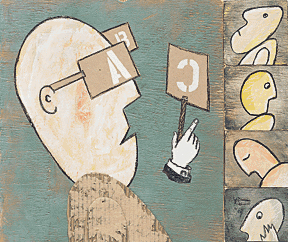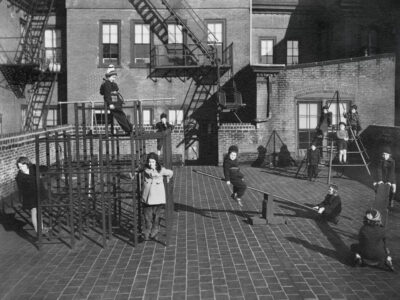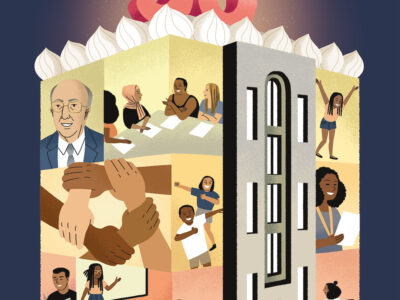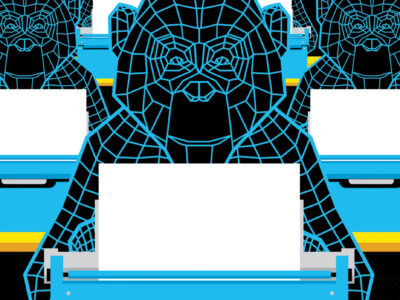
“The schooling industry suffers from a serious case of hardening of the arteries,” said James A. Kelly, as he diagnosed the U.S. public-education system in a lecture titled “Schools as Markets: The New Political Economy of Education,” delivered at Penn in April. “The organizational arrangements for schools are encrusted with old ways and they remain, essentially, command-and-control organizations.”
Kelly, a former teacher who currently serves on the Institute for Educational Leadership’s board of directors, is also a former overseer of the Graduate School of Education, which co-sponsored the annual Gordon S. Bodek Lecture of Distinguished Educators. (The lecture is named after co-sponsor Gordon S. Bodek C’42, and was given in Houston Hall’s Bodek Lounge.) He explained that while public schools have altered their external structure—dropping from 130,000 to 15,000 different school districts during the Great Depression, advancing in science and math during the Cold War, de-segregating in the 1960s—the internal classroom set-up has budged little since 1945.
“Work is organized in physically isolated classrooms which look much like classrooms of 25 years ago, or 50 years ago, or 75 years ago,” he stressed, pointing out the difficulties of asking experienced teachers to supervise new teachers when each class operates behind closed doors. What’s more, teachers often cannot be recruited by new schools even if their teaching skills are assessed as excellent, since many pension systems are organized to keep teachers within a single state or school district.
Fault lies also with those who teach the teachers. While Kelly cited the pre-service education requirements that exist in a thousand accredited colleges, he stated that as far as he knows, “no college teacher curriculum has ever been denied accreditation by any state in the history of the United States.” The problem, he added, lies with legislators who protect the very education programs that an accreditor may deem inferior.
Another roadblock to better schools is, ironically, teacher incentives. According to Kelly, most teachers’ salary schedules provide rewards for taking university courses even if the courses are irrelevant to teaching assignments. “As a matter of fact, a large proportion of the courses that are taken by practicing school teachers … are designed to help the teachers leave teaching, to go into supervision,” Kelly added, which leads to the second problematic salary incentive: teachers “seek advancement or promotion, as it is called, which means leaving teaching and being paid more never to teach again.”
Recent efforts to improve student performance—which focus mainly on internal classroom instruction and not on re-examining school technology or possible summer lessons—are too narrow in scope, Kelly charged, and are designed “not to provide a whole lot of extra resources in the classroom but to get out the wet noodle and test those kids more and more—and then do something if we don’t get the answer that we want.” Often, standardized test results are returned to teachers months after the students have been promoted out of their classes.
Kelly decried “an absence of what used to be called ‘the purposes of education,’” noting that personal, social, emotional, physical, and moral development are not considered part of intellectual development and are thus not emphasized in some schools. Pointing to the collapse in music and art education in many schools, Kelly urged educators to pay attention to the elements of pop culture now replacing teachers. “If you’re teaching kids and you haven’t watched MTV recently—and its cousins and brothers and sisters in the media—you really should. You won’t ‘get it’ otherwise.”
School choice is a solution—though not in its present form of vouchers and privatization. Charter schools enhance choice, but only insofar as they make possible a change of governance; they do not offer parents a radically different concept of education. “I think [school-choice advocates] essentially want to wrap the whole decision structure into one big blunderbuss decision: which school, take the whole enchilada. It’s either this one or that one, and that’s all of our choice,” he said, adding that many parents are apathetic on the issue—possibly because there are no interesting alternatives to public education, and possibly because school choice boils down to a decision between paying public-school taxes or paying those taxes plus private tuition.
Unlike teachers, Kelly noted, accountants, doctors, and lawyers are the top professionals in their firms, hiring managers for support. He suggested that schools follow that example: “No one should be paid a higher salary in the school than the best teacher.”
—Sarah Blackman C’03




